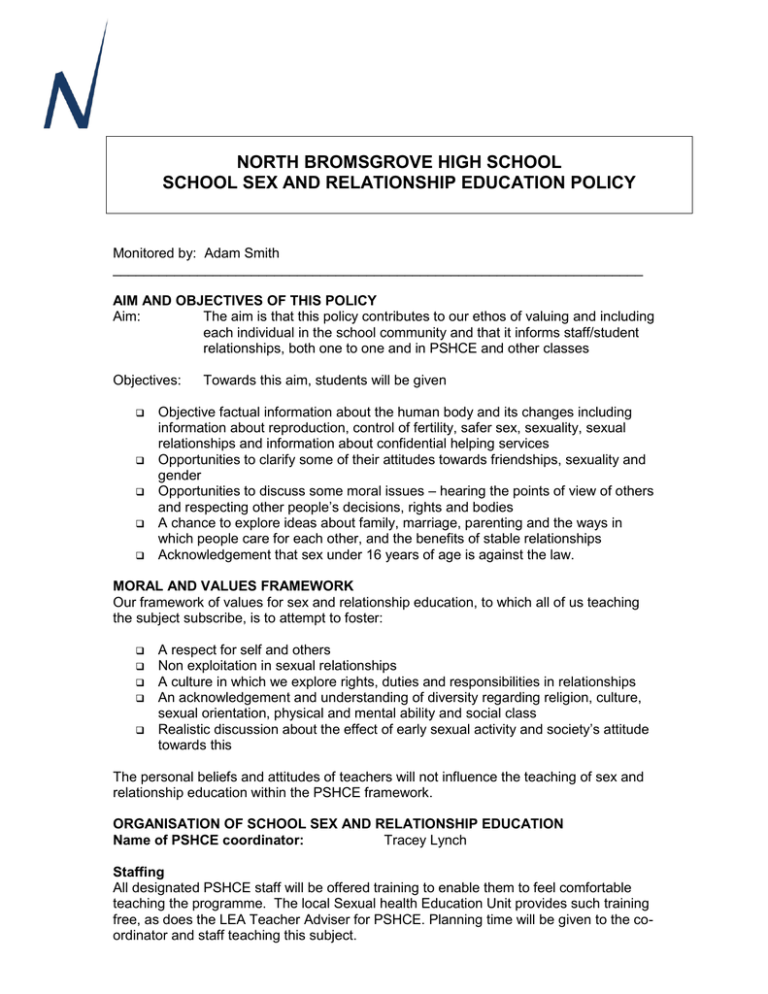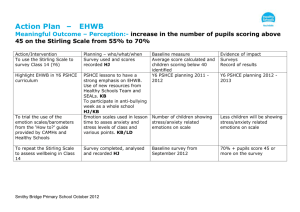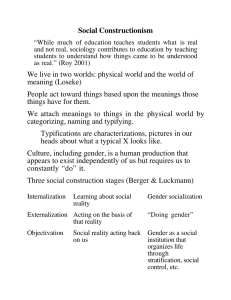
NORTH BROMSGROVE HIGH SCHOOL
SCHOOL SEX AND RELATIONSHIP EDUCATION POLICY
Monitored by: Adam Smith
_____________________________________________________________________
AIM AND OBJECTIVES OF THIS POLICY
Aim:
The aim is that this policy contributes to our ethos of valuing and including
each individual in the school community and that it informs staff/student
relationships, both one to one and in PSHCE and other classes
Objectives:
Towards this aim, students will be given
Objective factual information about the human body and its changes including
information about reproduction, control of fertility, safer sex, sexuality, sexual
relationships and information about confidential helping services
Opportunities to clarify some of their attitudes towards friendships, sexuality and
gender
Opportunities to discuss some moral issues – hearing the points of view of others
and respecting other people’s decisions, rights and bodies
A chance to explore ideas about family, marriage, parenting and the ways in
which people care for each other, and the benefits of stable relationships
Acknowledgement that sex under 16 years of age is against the law.
MORAL AND VALUES FRAMEWORK
Our framework of values for sex and relationship education, to which all of us teaching
the subject subscribe, is to attempt to foster:
A respect for self and others
Non exploitation in sexual relationships
A culture in which we explore rights, duties and responsibilities in relationships
An acknowledgement and understanding of diversity regarding religion, culture,
sexual orientation, physical and mental ability and social class
Realistic discussion about the effect of early sexual activity and society’s attitude
towards this
The personal beliefs and attitudes of teachers will not influence the teaching of sex and
relationship education within the PSHCE framework.
ORGANISATION OF SCHOOL SEX AND RELATIONSHIP EDUCATION
Name of PSHCE coordinator:
Tracey Lynch
Staffing
All designated PSHCE staff will be offered training to enable them to feel comfortable
teaching the programme. The local Sexual health Education Unit provides such training
free, as does the LEA Teacher Adviser for PSHCE. Planning time will be given to the coordinator and staff teaching this subject.
Approach and Methodology
We use a variety of teaching methods including active learning, discussion and project
learning, and encourage reflection. A safe environment for discussion is created by the
use of ground rules and distancing techniques. We carefully select leaflets and other
written material from the best that is available at any time (parents are very welcome to
see any of this material). The Key Stage 3 teaching resource produced by the Sexual
Health Education Unit is used along with other material. Informal language for parts of
the human body, and sexual activity, will/may be used in the class but formal terms will
be taught.
Teachers will be offered guidance on answering students’ questions as part of their
specialist training. If a question seems too explicit, or inappropriate for the whole class,
the teacher will acknowledge it and address it later on an individual basis.
Curriculum Entitlement
One period of 50 minutes per week is available for PSHCE for each student. Some
aspects of health and sex education will be covered in this time.
Procedures for reviewing effectiveness of programme
Evaluation meetings will be held annually with all staff teaching the programme. We
intend to review the programme in the light of staff and student views, every 12 months.
Questionnaires for students, discussion between staff teaching it.
School liaison with Primary/Middle School Feeders
Regular liaison with the feeder school is carried out where appropriate and our
programme is informed by what students are taught in the primary and middle schools
feeding into this one.
Complaints Procedure
Any complaint about the content or delivery of the sex and relationship education
programme should be addressed to the PSHCE Co-ordinator.
EQUAL OPPORTUNITIES
This policy links closely with the Equal Opportunities policy, the Anti- Bullying Policy and
the County Guidelines on Safeguarding Children. Equal opportunities is not about
treating everybody the same – but about helping to redress imbalances. When students
struggle they are offered more help to benefit from their schooling. If they are struggling
within relationships, identity or loss we will try to provide them with the support they need
– either inside the school or externally. It is well documented that students are
sometimes bullied because of their perceived sexual orientation. This school takes this
and all forms of bullying very seriously.
Objective discussion of homosexuality and diversity in sexual orientation will take place
in sex and relationship education lessons in order to meet the needs of all pupils. There
will be no promotion of any sexual orientation.
In the PSHCE programme we attempt to select activities and resources which are age,
experience, reading level and culturally appropriate. All lessons attempt to engage boys
and girls equally well.
SPECIFIC ISSUES STATEMENTS
Withdrawal of pupils from sex and relationship education
Any parent wishing to withdraw their child from sex and relationship education should be
encouraged to make an appointment with the PSHCE Co-ordinator, to discuss the
matter. Students cannot be withdrawn from any part of the teaching which falls within
the National Curriculum.
Inevitably there will be occasions when discussion of aspects of sexual behaviour and
choices will arise in other curriculum areas. These discussions will be sensitively
handled – and, if appropriate, the teacher can ask a relevant PSHCE teacher to develop
the subject at another time.
The links between the sex and relationship programme and the science curriculum will
be identified and will be made clear to the students and staff, as will the links with the
Citizenship Curriculum.
Contraceptive ‘advice’, information and referrals, and under 16s
Students will be taught about controlling fertility and safer sex as part of the sex and
relationship education programme. This will include information on how all students,
including under 16s, can access local services for confidential advice and treatment.
Students who have been withdrawn from sex and relationship education by their parents
are still entitled to the information about local services. Worcestershire’s Little Directory
will be available for all students.
It is not the role of teachers to advise on health issues, in any detail. They should
encourage the students to talk to a parent/carer, and/or school nurse, young peoples’
health services (Time 4U) or GP.
Confidentiality (in the classroom)What a student says or write in the classroom is by
definition not confidential. Students should be encouraged to speak in general terms,
rather than persona, by the use of ground rules and distancing techniques. When
discussing issues in the classroom student disclosure which indicate the student is at
risk (see below) must be reported by the teacher to the Head of House who will inform
the designated senior manager for child protection – Deputy Headteacher, Ms Baxter or
Mrs Worrall, who will decide whether parents should be informed, and any other action
to be taken. Class teachers should not go direct to parents with disclosures. If a
class teacher is reporting a disclosure the pupil should be told this.
Confidentiality (individually)
Teachers should not promise absolute confidentiality to students. However, teachers
are only obliged to pass on disclosures as defined by this policy. If a teacher believes a
student to be at risk, she/he should informed the Head of House who will informed the
Child Protection Officer/Headteacher and tell the student this is what they are doing.
Teachers will recognise the importance of listening to the concerns of individual
students. Staff will also be aware that young males find it more difficult than females to
express emotions, and will offer support where possible. Again, teachers will not go
against the student’s wishes and talk to the parents. The Headteacher will decide what
action, if any, to take
Students are deemed to be ‘at risk’ if they are:
Involved in situations where they can endanger themselves or others
Involved in situations where they are being exploited or are exploiting others
Victims of abuse, physical/sexual or emotional; this would require referral to the
Child Protection Officer
If a teacher learns from an under 16 year old that they hare having, or contemplating
having, sexual intercourse, they should take steps to ensure that:
wherever possible, the young person is persuaded to talk to their parent or carer
that the young person understand the need for advice on sexual health and is
given precise information about where he/she can access confidential
contraception and advice services
any child protection issues are addressed
Pregnancy
Any student who is continuing with a pregnancy will be given time with the Head of
House/Deupty Head/Education Welfare Service to ensure she knows how she may
continue her schooling and what benefits, child care etc. are available. The school
nurse will help her to access ante and postnatal care.
We will also be sensitive to the needs of young fathers (to be). They will receive support
around the behaviour of peers, and information on sources of advice on legal and other
issues e.g.CABs.
Procedure for involving outside educators including health professionals in the
delivery of the programme
External educators can make a valuable contribution to the sex and relationship
education. They must be familiar with this policy and contribute to the programme as
agreed with the teacher, subscribing to our school moral and values framework, and
using resources and methods agreed with the teacher. The teacher will be present
during the session, and will negotiate their own role during the class, in advance.
The school nurse as health advisor/support for students
The school nurse offers a completely confidential health service (except in cases of
Child Protection)on Monday lunchtimes to students, on a drop-in basis, where any
student can talk about emotional or physical health issues.
Procedure for supporting any members of the school community infected with
HIV, Hepatitis B or C
Staff should not expect to be informed of a student’s or a colleague’s HIV or Hepatitis
status. A member of staff who is told of a student’s blood borne viral status, should
inform the Headteacher and no one else. She will tell the student this is what they are
doing. No student or member of staff will be discriminated against as a result of such a
disclosure.
First aid and control of infection practice should always follow current guidelines, and
assume that blood spills can be infectious in some circumstances.
WORKING WITH PARENTS
This policy is regularly reviewed by the Governors’ Pastoral Sub-Committee which
includes parent governors. Parents may request copies of this policy from the School
Office.
DISSEMINATION
All staff receive a copy, all new staff will be given a copy as part of their induction, and all
parents will be given a copy on request.





